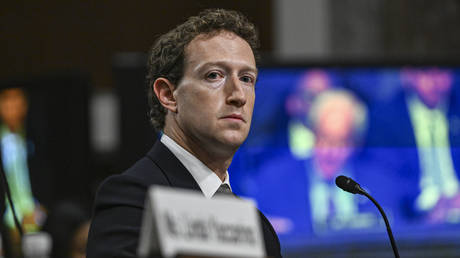Zuckerberg’s Unexpected Relaxation on Censorship Is Not Equivalent to Free Speech
Facebook is making efforts to realign its position in order to maintain relevance. However, the question remains: will it take substantive action to address the demands for freedom instead of just offering superficial responses?

Why are some individuals embracing the idea that reinstating the ability to freely use words like “c**ts,” “d**ks,” and “a*****es” on Facebook represents a significant advance for free speech, akin to the Magna Carta?
Facebook’s previous role as a safe space for sensitive individuals is now expected to evolve into a hub of free speech and discourse. However, this shift seems limited in scope. Apparently, certain voices are now free to label transgenderism as a mental illness while others remain under the watchful eye of the platform's guidelines.
Mark Zuckerberg, founder of Facebook and its parent company, Meta, recently announced that American users would no longer experience oversight from third-party fact-checkers. Instead, the company will adopt a Community Notes model, which draws inspiration from Elon Musk’s X Platform. This decision follows Zuckerberg’s visit to Mar-a-Lago where he met with Donald Trump, the US President-elect, and Musk, who has branded himself as a “free speech absolutist.”
Meta’s announcement points to “societal and political pressure to moderate content,” suggesting that such moderation has "gone too far." It wasn't until August 2024 that Zuckerberg acknowledged in a congressional committee that “in 2021, senior officials from the Biden Administration, including the White House, repeatedly pressured our teams for months to censor certain COVID-19 content, including humor and satire.” He mentioned that these decisions were made with a level of hindsight that indicated they were unwise.
In that same letter, he revealed that the FBI had warned his team about a purported “Russian disinformation operation” involving the Biden family and Burisma, the Ukrainian energy company where President Joe Biden’s son, Hunter, served on the board. Zuckerberg stated he now understands that the story was legitimate, contrary to the FBI's claims of it being false, a realization that came only after the New York Post published contrary information that Facebook had censored.
Previously, designated professionals across various countries assisted Meta in ensuring compliance with specific narratives. For instance, in Canada, AFP Fact Check claimed there’s “no evidence linking methane inhibitors for cows to human health problems,” justifying the government's initiative to reduce methane emissions from cattle through a feed additive called Bovaer 10, which aims to combat climate change.
Concerns have been raised about whether this feed additive could somehow contaminate milk or meat, but fact-checkers assure the public that the government deems it safe—case closed, until it potentially isn’t. Alternate information often surfaces only after the fact, especially when related to official decisions that later turn out to be flawed. Yet, engaging in such discussions on Facebook raises the risk of being flagged by algorithms constantly on the lookout for “wrongthink.”
This shift in policy within the U.S. marks a return to an environment reminiscent of post-2016 when there was widespread panic among Democrats and anti-Trump factions over alleged Russian interference in the election via social media, leading to demands for increased censorship of so-called fake news, as defined by establishment-friendly sources.
The ensuing censorship led Meta to prioritize “trustworthy” information sources in 2018, a trend that intensified during the COVID-19 pandemic in 2020. Following the Capitol riots in January 2021, Facebook suspended Trump’s account indefinitely, citing a need to combat violence and misinformation.
In September 2024, as the U.S. presidential election campaign ramped up, Meta imposed a global ban on Russian media accounts like RT, framing it as a response to “foreign interference” and significantly limiting exposure to alternative viewpoints that could challenge mainstream narratives. Users encountering RTN news articles on Facebook receive warnings to exercise caution, while no such warnings accompany Western news outlets, which are constantly aligned with the perceived truth.
However, it remains unclear whether users outside the U.S. will experience a similar easing of restrictions or whether Americans will still face more nuanced forms of censorship regarding information sources.
France has openly expressed concerns about these relaxed rules. “France remains vigilant and committed to ensuring that META, along with other platforms, comply with their obligations under European law, particularly the Digital Services Act,” stated the Ministry of Foreign Affairs. This law had previously led the EU to threaten Musk with regulatory oversight ahead of his planned online interview with German right-wing populist leader Alice Weidel, a candidate favored in upcoming elections.
“Freedom of expression, a fundamental right protected in France and Europe, should not be confused with a right to virality,” the French government emphasized, highlighting the need for moderation to prevent the spread of inauthentic content. However, such moderation may also limit the breadth of debate and the diversity of perspectives.
“France reiterates its support for civil society actors worldwide who are committed to defending and reinforcing democracies against information manipulation and destabilizing actions by authoritarian regimes,” the French statement claimed. This raises a conversation about the government's own perceived authoritarian tendencies, particularly under President Macron, whose administration has faced criticism for sidelining populist voices.
The interplay of online censorship and Big Tech collaboration with platforms like Facebook has contributed to a growing disconnect between official narratives and the lived experiences of people across the Western world. This disconnect often leads to surprising electoral outcomes, reflecting the realities of those who feel ignored by the digital censorship mechanisms that maintain a limited worldview for certain audiences.
As Facebook seeks to realign itself to maintain relevance, it remains to be seen whether it can genuinely adapt to the demands for a free flow of information and ideas or if it will merely pretend to do so.
Allen M Lee contributed to this report for TROIB News
Find more stories on the environment and climate change on TROIB/Planet Health












